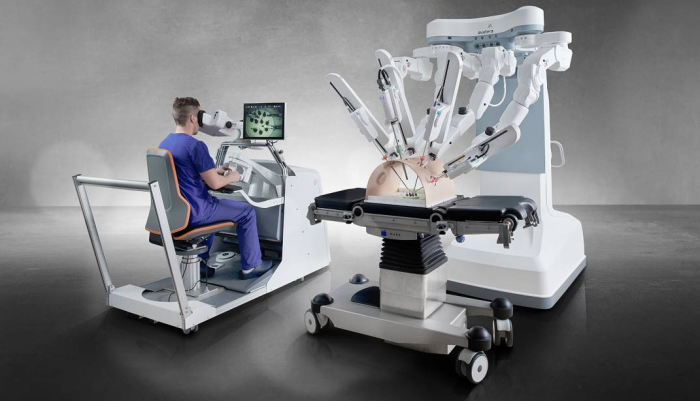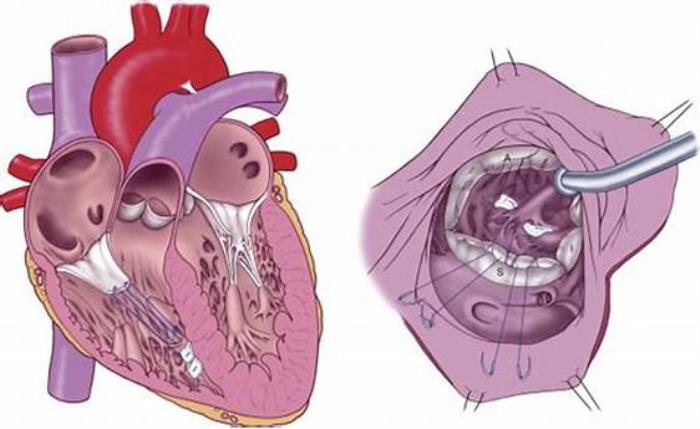Robotic surgery is revolutionizing cardiac care, offering patients minimally invasive options that combine precision, control, and faster recovery. As technology has advanced, robotic systems have become integral in treating complex heart conditions, from coronary artery disease to structural heart defects. These systems are changing the landscape of heart surgery, providing surgeons with enhanced capabilities to perform delicate procedures with accuracy that is difficult to achieve through traditional methods.
Medical disclaimer: This content is for general awareness and does not replace a doctor’s consultation. For diagnosis or treatment decisions, consult a qualified specialist.
What Is Robotic Heart Surgery and How Does It Work?
Robotic heart surgery involves a surgeon controlling robotic arms equipped with surgical instruments from a console. The system provides high-definition, 3D imaging of the surgical field, allowing the surgeon to visualize the heart in unprecedented detail. The robotic arms replicate the surgeon’s precise movements, offering a high degree of dexterity and control. While the robot assists in movement, every action is directed by a skilled surgeon, ensuring that the surgery maintains the benefits of human oversight combined with technological precision.
Advantages of Using Robotics in Treating Heart Conditions
Robotic heart surgery offers numerous advantages over traditional open-heart surgery, including smaller incisions, reduced blood loss, decreased pain, and a faster recovery. Because robotic procedures are less invasive, patients typically experience less trauma and scarring. The advanced imaging and enhanced dexterity of robotic systems enable surgeons to perform complex repairs with greater accuracy, reducing the likelihood of complications and potentially improving long-term outcomes. These benefits make robotic heart surgery an attractive option for patients seeking effective treatment with a shorter hospital stay and quicker return to normal activities.

Coronary Artery Disease: Robotic-Assisted Bypass Surgery
Robotic-assisted bypass surgery for coronary artery disease is a minimally invasive alternative to traditional open-heart bypass surgery. Using small incisions, robotic systems allow surgeons to bypass blocked arteries with precision, restoring blood flow to the heart muscle without the need for a sternotomy (opening the chest). This approach is particularly beneficial for patients with isolated blockages or those at high risk for traditional surgery. Robotic-assisted bypass surgery often results in less pain, a shorter hospital stay, and a quicker recovery period, making it a viable option for many patients with coronary artery disease.
Mitral Valve Repair: How Robotics Improves Outcomes
Robotic surgery has also made significant strides in mitral valve repair, a complex procedure that requires meticulous precision. The robotic approach enables the surgeon to access the mitral valve through small incisions, avoiding the need for large openings. With enhanced visualization and control, robotic systems allow for precise repairs that help restore normal valve function, improve blood flow, and reduce the risk of future heart complications. Patients undergoing robotic mitral valve repair often experience fewer complications, reduced post-operative pain, and a quicker recovery compared to traditional open-heart methods.
Aortic Valve Replacement: Minimally Invasive Robotic Options
Aortic valve replacement is another area where robotic surgery has shown promising results. In traditional surgery, replacing the aortic valve requires a large chest incision, but robotic systems can achieve this with smaller incisions, resulting in less trauma and a faster recovery. Minimally invasive robotic techniques are particularly beneficial for patients with aortic stenosis who may not be suitable candidates for open surgery. By using a robotic approach, surgeons can replace the aortic valve with precision, potentially improving patient outcomes and reducing recovery times.
Treatment of Atrial Septal Defects (ASD) with Robotic Surgery
Robotic surgery is also being used to repair atrial septal defects (ASDs), which are holes in the heart’s septum that can lead to complications if left untreated. Using robotic assistance, surgeons can close ASDs with minimal incisions, reducing the risks associated with traditional open-heart surgery. The robotic system provides better access and visualization of the defect, allowing for a more accurate and efficient repair. For patients with ASD, robotic surgery can offer a safer, less invasive alternative with reduced post-operative pain and faster healing, making it an effective option in structural heart defect treatment.
Robotic Surgery for Atrial Fibrillation: Precision Ablation
Robotic surgery offers precision for treating atrial fibrillation through ablation procedures. With high-definition 3D visualization and precise control, robotic systems help surgeons target specific heart tissues causing arrhythmias, leading to improved outcomes and reduced complications in patients with atrial fibrillation.
Complex Arrhythmias: How Robotics Enhances Ablation Procedures
Robotics brings a new level of precision to complex arrhythmia ablation, allowing for fine-tuned control over catheter placement. This precision is particularly advantageous for challenging cases, improving both the safety and efficacy of arrhythmia treatments.
Robotic-Assisted Surgery for Tricuspid Valve Repair
The tricuspid valve, due to its location, can be challenging to access in open surgery. Robotic-assisted surgery allows for a minimally invasive approach, enhancing visualization and dexterity to achieve effective repairs with smaller incisions and quicker recovery.

Cardiac Tumor Removal: Minimally Invasive Robotic Techniques
Robotic techniques offer a minimally invasive solution for removing cardiac tumors, reducing the need for large incisions. This approach minimizes trauma, decreases the risk of complications, and allows for a faster and more comfortable recovery.
Hybrid Procedures: Combining Robotics with Other Cardiac Therapies
Hybrid procedures combine robotic surgery with other therapeutic techniques, allowing for comprehensive treatments. For example, robotic assistance in combination with catheter-based interventions can be especially useful in complex cases, enhancing precision and patient outcomes.
Congenital Heart Defects: Robotic Options for Pediatric Patients
Robotic surgery is increasingly being used in pediatric patients with congenital heart defects. By enabling less invasive procedures, robotics reduces scarring, lowers the risk of infection, and supports a gentler recovery for children with heart defects.
Repair of Ventricular Septal Defects (VSD) with Robotic Assistance
Robotic-assisted surgery enables precise closure of ventricular septal defects (VSD) without the need for a full open-heart procedure. The enhanced accuracy of robotic tools helps improve outcomes, making it a valuable option for patients with this condition.
Benefits of Robotic Surgery for Multiple Valve Replacements
For patients needing multiple valve replacements, robotic surgery offers a streamlined, minimally invasive approach that reduces trauma to the chest and heart. Robotic tools allow surgeons to access and repair or replace multiple valves in a single, carefully managed procedure.
Endocarditis Treatment with Robotic Surgical Techniques
Robotic techniques offer a minimally invasive alternative for treating endocarditis, an infection of the heart valves. This approach reduces the trauma associated with open-heart surgery and supports a more manageable recovery, which is especially beneficial for patients with compromised health.
Robotic Surgery for Thoracic Aortic Aneurysm Repair
Robotic surgery is emerging as a minimally invasive option for thoracic aortic aneurysm repair. This approach allows precise navigation and reduced risk, making it a promising alternative for patients who require repair of the aorta.
Reoperations and Redo Surgeries Using Robotic Techniques
Robotic techniques are particularly beneficial in reoperations or redo surgeries, where scar tissue from prior procedures can make open surgery more complex. Robotics enhances precision and allows for minimally invasive access, reducing the risks associated with multiple surgeries.
Patient Selection: Who Benefits Most from Robotic Heart Surgery?
Ideal candidates for robotic heart surgery typically include patients who need minimally invasive procedures, such as valve repair, arrhythmia ablation, or select congenital defect repairs. Suitability depends on the patient’s health, anatomy, and the complexity of their condition, evaluated by a cardiac specialist.
Benefits of Robotic Heart Surgery Compared to Traditional Methods
Explore the advantages of robotic heart surgery over traditional surgical methods. This section highlights benefits such as reduced trauma to the body, shorter hospital stays, and improved precision during surgery, leading to enhanced recovery and outcomes for patients.
Medications for Managing Symptoms Before and After Robotic Surgery
Learn about the medications used to manage symptoms related to robotic heart surgery. This section discusses various pharmaceutical options available before the procedure to prepare patients, as well as post-operative medications to help manage pain, prevent infections, and promote recovery.
Conclusion: The Expanding Scope of Robotic Heart Surgery in Cardiac Care
Robotic heart surgery continues to expand the possibilities for treating various cardiac conditions with less invasive, more precise methods. As technology advances, the scope of robotic procedures will likely grow, offering more patients the benefits of safer and more efficient heart care.
Best Robotic Heart Surgery in India
The Best Robotic Heart Surgery in India offers a minimally invasive approach to complex heart procedures, utilizing robotic technology to improve precision and reduce recovery time.
Robotic Heart Surgery Cost in India
The robotic heart surgery cost in india is competitive, offering patients affordable options for high-precision heart surgery with transparent pricing and accessible care.
Best Robotic Heart Surgeons in India
The Best Robotic Heart Surgeons in India are highly trained in robotic techniques, providing personalized care and expert precision in complex heart surgeries.
FAQ
What heart conditions can be treated with robotic surgery?
Robotic surgery can treat various heart conditions, including atrial fibrillation, valve diseases, congenital heart defects, and thoracic aortic aneurysms.
Is robotic heart surgery effective for valve repair?
Yes, robotic surgery is highly effective for valve repairs, especially in mitral and tricuspid valve procedures, due to enhanced precision and reduced invasiveness.
Can robotic surgery treat congenital heart defects?
Yes, robotic techniques can be used to treat select congenital heart defects, providing a less invasive option for younger patients with conditions like atrial septal defects and VSD.
What are the benefits of robotic surgery for coronary artery disease?
For coronary artery disease, robotic surgery offers benefits such as reduced incision size, quicker recovery, and potentially fewer complications when performing bypass grafts.
Are there any risks in using robotic surgery for heart conditions?
While generally safe, robotic heart surgery has some risks, including potential equipment malfunctions, access limitations, and the need for a highly skilled surgical team.
Explore the Best Heart Care Resources in India
Find some of the top cardiologist, surgeons and the best heart hospitals in India
Best Heart Hospitals in India
Choosing the right hospital is crucial for successful heart treatments. If you want to explore trusted options, check the list of Best Heart Hospitals in India offering world-class facilities, advanced cardiac care units, and experienced teams for both simple and complex procedures.
Best Cardiologists in India
Finding the right cardiologist can make a huge difference in early diagnosis and long-term heart health. If you are looking for the Best Cardiologists in India, see this curated list of experts who specialize in preventive care, interventional cardiology, and complex heart disease management. Check the full list Best Cardiologists in India.
Best Cardiac Surgeons in India
If you are planning for heart surgery and need top-level expertise, we recommend exploring the Best Cardiac Surgeons in India. These surgeons have a proven record in performing bypass surgeries, valve replacements, and minimally invasive heart operations with excellent outcomes.
Get more indepth information on Cardiology treatments and their costs.
Conclusion
Your cardiology health deserve the best care. Explore the links above to learn more about the top cardiac hospitals and cardiac surgeons in India.
Updated for 2025 – Discover the best hospitals in India for robotic heart surgery, including top choices, advanced techniques, and cost-effective options. Robotic Heart Surgery Cost in India
Discover the best hospitals in India for robotic heart surgery, including top choices, advanced techniques, and cost-effective options. Best Robotic Heart Surgery Hospitals in India
Robotic heart surgery offers numerous advantages over traditional methods, such as reduced trauma, faster recovery, and lower risk of complications. Smaller incisions lead to less pain and scarring, while increased precision enhances surgical outcomes. Patients benefit from shorter hospital stays and a quicker return to normal activities. This innovative approach revolutionizes cardiac care by combining minimally invasive techniques with advanced robotic technology, ultimately improving patient experiences and health outcomes. Benefits of Robotic Heart Surgery Compared to Traditional Methods